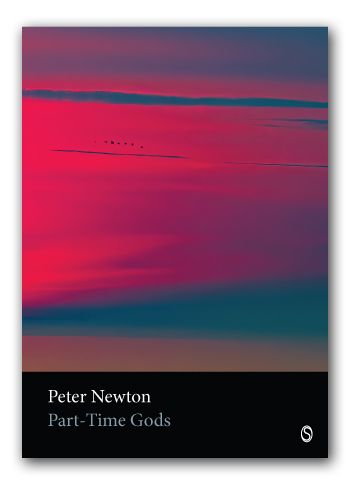
Book Review: Part-Time Gods
By Peter Newton
Published by Snapshot Press
2022, ebook, 32 pages
Available as free flipbook or downloadable PDF
Access the Book

Peter Newton’s Part-Time Gods got me at the title, which gives credence to the advice we read about the importance of titles: how they often do, or should, indicate or at least hint at a theme, how they can offer a key to the text. This book’s a thoughtful meditation on dying, on how to live before death rings the doorbell, as well as observations on others facing their own deaths. The topic is common enough, one that’s often buried in platitudes and numbing theological debates most children can stump with a couple of simple Douglas Adams questions: Who is this god person, anyway? and Why would he or she want us to die? However, after reading this chapbook, I felt that I too might be a part-time god somewhat responsible for my now and its inevitable end. That’s a good read, in my book.
The first and eponymous haibun of the chapbook sets the stage: a Terry Pratchett–designed workroom in heaven with a part-time god narrator enumerating some of the tasks that must be done to make the illusion real, or the reality magical, and complaining about how people outside don’t understand what it’s all about. “It’s a sprawling complex no would believe.” Who could? But of course, we often do, in one way or another. At the end of the haibun, the tone for the remainder of the chapbook is signaled in the capping haiku. “Hey,” the narrator calls out to another part-time god, “while you’re standing there, dial up the magic on that.”
magenta sunrise
my belief in
what I don’t know
That haiku could almost be a definition of faith. And death, impending or otherwise—one’s own, that of loved ones, of animals, and perhaps even of hopes and dreams—has a way of focusing one’s mind. Newton’s meditation is something meant for thinking adults who still have a spark of child-like imagination and skepticism, that amazing combination of belief and doubt. You have to wonder. If you don’t, what’s the point?
Death, not surprisingly, isn’t a one-dimensional beast but rather a cluster of thoughts and feelings—hope and despair, wonder and delusion (or disillusionment), the spoken and the unspoken, the literal and the metaphorical. Death, “[t]his inevitable doom,” is also a part of nature—and nature, for some, is as good a god as any. It also tends to encourage philosophical musing. Here’s a brief selection of some gems in the collection:
The world is in ruins and I am thinking maybe these people on the plane have gone searching. That kingdom of kindness I’ve heard tell about. Or was that only me talking, spreading rumors of a better world.
(from “The Anatomy of Hope”)Almost too beautiful to believe . . . the world we live in. Nothing to do but look, listen and feel. This is how you come back to life.
(from “Whooping Creek Church Road”)You have to fill the space you’re given.
(“The Usher”)At the bottom she runs right back up
as if life were a ride to do again and again.
I know and I don’t know.
. . . the dog shows me again
how to let gravity take you
for as long and as far as possible.
(“As Fate Would Have It”)They sing as if they know their time is near.
(“Nature Narration”)This place, the people who farmed here have all changed a long time ago into something else. And here I am no different, only somewhere else in the process.
(“Victory Dashboard Road”)
Philosophical musings aside, this collection is also a workshop in chapbook construction. First, in a chapbook of 24 haibun, only two of which are more than a page long, there’s variety. Although the one-block-of-prose-plus-a-haiku haibun and variations on that form are well represented, one also encounters a prose sentence divided by haiku, one haibun with a run-in title, and a couple more of free verse plus haiku. Most of the haiku are traditional three-line compositions and a few are one-line haiku. Four of the haibun contain what I call divided or split haiku, each line of a three-line haiku separated by blocks of prose.
There seems to be a trend of divided haiku. It certainly adds variety, but if that’s all it does, is it nothing more than pandering to readers with short attention spans? One might argue it creates suspense, but that’s not how most haiku work. And if the same haiku in the conventional three lines works, what justification is there for splitting it? There are some literary issues to consider, foremost being the role of the link-and-shift between haiku and prose, a hallmark of the haibun craft. When one-line English-language haiku began showing up regularly in journals, it was obvious writers weren’t all on the same page, and readers had to be taught to read one-line haiku. (The short story had similar growing pains.) A conventional three-line haiku written in one line doesn’t work very well. And I’m not convinced a conventional three-line haiku split into three lines between blocks of prose works very well.
Consider “The Usher.”
“Good Morning,” he bellows once the elevator doors slide closed and we ascend. Despite a jacket two sizes too big, there is a fullness about him. His tone is exuberant.
summer’s end
Heads bowed, I and a few other passengers rouse from our assumed positions of indifference. Most of us are visitors preoccupied with our own reasons for being in a hospital. We stammer out our delayed greetings: “Morning.” “Hello.” “How’s it goin’.” He shakes his bald head, tries again. “Thought I’d break the silence … I mean, here we are, right?”
the tallest one in line
He has a force behind his drawn cheek. Something intact. It’s as if he were rallying a team of strangers to give it all they’ve got: C’mon people. I gotta fight this cancer and carry the conversation? Couldn’t we just extend a little courtesy? I take his meaning: You have to fill the space you’re given.
at the ice cream truck
The doors slide apart like curtains. The man extends his arm as if introducing me to the world.
This is a wonderful haibun, but the haiku would have more resonance as a conventional three-line haiku at the end. Certainly splitting the haiku adds nothing to the haibun. There doesn’t appear to be any link-and-shift between the first prose block and line 1. The same can be said for lines 2 and 3. Of course, I don’t really know if that’s what’s expected of a split haiku. Who does? But this is hair-splitting, if I may be excused both a cliché and a pun of sorts, as the haibun in this collection are mostly excellent.
At the end of the creative process is the art of compiling a poetry collection. I’m going to skip the bit about researching where to submit a manuscript. Putting a manuscript of poems together is not what it once was: gathering up one’s best or most representative work. Now, there needs to be a theme, or themes, which, as I’ve noted, Newton has. As many haibun collections are compilations of previously published pieces, selection and organization can be tricky. There may be chronological issues, stylistic dissonance amongst haibun, and some pieces that just haven’t aged well and shouldn’t be shoehorned in even if they do give the theme support. Newton has avoided those issues and Part-Time Gods is a cohesive chapbook, focused, but not so much that the peripheral vision of the reader’s imagination is blurred.
About the Reviewer

Bob Lucky is the author most recently of My Thology: Not Always True But Always Truth (Cyberwit, 2019) and the chapbook Conversation Starters in a Language No One Speaks (SurVision Books, 2018), which was a winner of the James Tate Poetry Prize in 2018. Lucky lives in Portugal, where he is working his way through all the regional cheeses and wines.

Hi Bob,
Damn man, a good review of good writing, think it takes both the writer and the reviewer to articulate the language of various poetic forms, and you certainly do. Your review helps me better understand Peter Newton’s writing and form, thanks to you both. I’ve always been a fan of your writings Bob, and your reviews are ever increasing my understanding of your gifts.
Cheers my Friend,
Michael